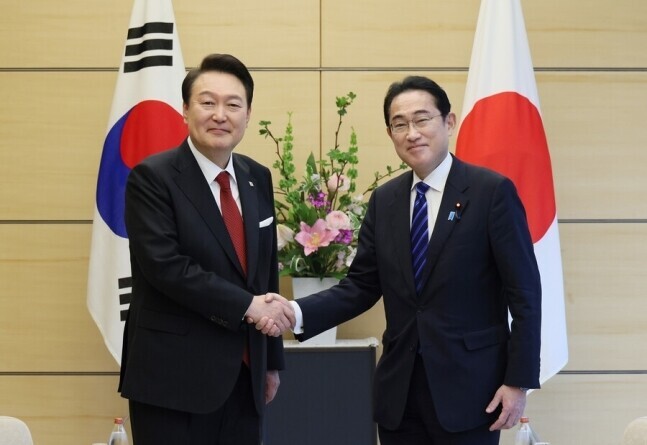hankyoreh
Links to other country sites 다른 나라 사이트 링크
Japan tries its luck on Dokdo after Yoon’s concessions on forced labor

Japanese government authorities have repeatedly expressed their intention to treat their claim to the South Korean territory of Dokdo as a “diplomatic issue” that must be resolved if the two countries are to improve their relationship. The weakness that President Yoon Suk-yeol revealed through his hasty diplomatic concessions to Japan appears to be impacting Dokdo, an issue on which Koreans will never bend.
Dokdo is a set of two main islands and surrounding islets in the East Sea sometimes referred to as the Liancourt Rocks, or Takeshima in Japan.
“We need to turn to the issue of Takeshima after the forced labor issue. We need to make a strong push [to resolve that issue] while Yoon is in office given his forward-looking attitude about improving Japan-Korea relations,” a senior member of the Japanese Cabinet was quoted as saying in an article published in the online edition of the Sankei Shimbun, a Japanese newspaper, on Wednesday.
Japanese Chief Cabinet Secretary Seiji Kihara said in a closed-door briefing after the Korea-Japan summit on March 16 that Japanese Prime Minister Fumio Kishida had told Yoon that they should continue making progress on pending issues, including Dokdo.
In short, Japanese government officials have repeatedly expressed the view that the issues that Korea and Japan need to deal with should include not only the 2015 “comfort women” agreement and the 2018 radar lock-on dispute, but also Dokdo.
Tokyo’s haughty approach appears to be grounded in a fatal flaw revealed by Yoon in his haste to improve relations with Japan and strengthen trilateral cooperation with Japan and the US. Seeing how Yoon has ignored sensitive historical disputes and defied the spirit of the Supreme Court’s October 2018 ruling about the forced labor issue, Japan appears to have concluded that he might offer some kind of concessions on the Dokdo issue as well.
The Sankei Shimbun stressed that Korea “cannot ignore the Takeshima issue if Korea and Japan are to build a genuine relationship of trust.”
“If even Yoon isn’t willing to talk [about the Dokdo issue] as he hastens to improve relations with Japan, the prime minister will have no choice but to doubt his sincerity about resolving [this issue],” the newspaper said, making a strong case for Dokdo to be added to the diplomatic agenda.
While Dokdo remains under Korea’s effective control, Japan has continued to claim that the island is its “integral territory” and is being “illegally occupied” by Korea.
Japan’s Shimane Prefecture adopted an ordinance declaring “Takeshima Day” in 2005, and the yearly festival has been attended by a Japanese government representative since 2013.
The claim that Dokdo belongs to Japan has appeared in Japan’s defense white papers since 2005, and in its foreign policy bluebooks since 2012. The same wrongful territorial claim is repeated verbatim in every textbook taught in elementary, middle and high schools.
Nevertheless, Japan hasn’t attempted to directly challenge Korea’s effective control over Dokdo. The one exception was when Tokyo said it would consider lodging a complaint with the International Court of Justice following former Korean President Lee Myung-bak’s visit to the island in August 2012.
But the situation is expected to change dramatically following Yoon’s diplomatic capitulation. Kishida is expected to bring up the Dokdo issue unilaterally, over Korean objections, at events including the G7 summit in Hiroshima this May.
To be sure, dealing with the Dokdo issue at the International Court of Justice would require the approval of the Korean government, which means Japan cannot change the status quo on its own. But considering that the Japanese leader dared to bring up the formerly taboo topic during a summit with the Korean president, it’s no stretch to describe this as a shocking triumph for Japanese foreign policy.
By Kim So-youn, Tokyo correspondent
Please direct questions or comments to [english@hani.co.kr]

Editorial・opinion
![[Column] Has Korea, too, crossed the Rubicon on China? [Column] Has Korea, too, crossed the Rubicon on China?](https://flexible.img.hani.co.kr/flexible/normal/500/300/imgdb/original/2024/0419/9317135153409185.jpg) [Column] Has Korea, too, crossed the Rubicon on China?
[Column] Has Korea, too, crossed the Rubicon on China?![[Correspondent’s column] In Japan’s alliance with US, echoes of its past alliances with UK [Correspondent’s column] In Japan’s alliance with US, echoes of its past alliances with UK](https://flexible.img.hani.co.kr/flexible/normal/500/300/imgdb/original/2024/0419/2317135166563519.jpg) [Correspondent’s column] In Japan’s alliance with US, echoes of its past alliances with UK
[Correspondent’s column] In Japan’s alliance with US, echoes of its past alliances with UK- [Editorial] Does Yoon think the Korean public is wrong?
- [Editorial] As it bolsters its alliance with US, Japan must be accountable for past
- [Guest essay] Amending the Constitution is Yoon’s key to leaving office in public’s good graces
- [Editorial] 10 years on, lessons of Sewol tragedy must never be forgotten
- [Column] A death blow to Korea’s prosecutor politics
- [Correspondent’s column] The US and the end of Japanese pacifism
- [Guest essay] How Korea turned its trainee doctors into monsters
- [Guest essay] As someone who helped forge Seoul-Moscow ties, their status today troubles me
Most viewed articles
- 1[Column] The clock is ticking for Korea’s first lady
- 2Hong Se-hwa, voice for tolerance whose memoir of exile touched a chord, dies at 76
- 3After 2 months of delayed, denied medical care, Koreans worry worst may be yet to come
- 4[Column] Has Korea, too, crossed the Rubicon on China?
- 5Samsung barricades office as unionized workers strike for better conditions
- 6US overtakes China as Korea’s top export market, prompting trade sanction jitters
- 7All eyes on Xiaomi after it pulls off EV that Apple couldn’t
- 8[Guest essay] How Korea turned its trainee doctors into monsters
- 9[Editorial] As it bolsters its alliance with US, Japan must be accountable for past
- 10[Correspondent’s column] In Japan’s alliance with US, echoes of its past alliances with UK